- Share practical knowledge of design, implementation, measurement, and evaluation of mentorship programmes
- Exchange ideas with researchers who bring fresh thinking from other fields to inform mentoring practices in academia and research. Explore how academic expertise can inspire new approaches
- Discuss alternative mentoring approaches with champions of innovative models like reverse mentoring. Challenge traditional practices and explore creative ways to make mentoring and research culture more inclusive and intersectional
- Build meaningful connections with others who are passionate about inclusive gender equality. Create opportunities for collaboration and shared work in both research and practice
- Celebrate mentees of the SelmaMeyerMentoring programme who have completed their mentoring journeys
Archiv der Kategorie: Nezařazené
Dr. Manuela Picariello
Organic Mentorship to Promote Inclusive Cultures
Mentorship plays a pivotal role in shaping the career trajectories of Early Career Researchers (ECRs), yet traditional approaches often fail to account for systemic barriers, diverse caree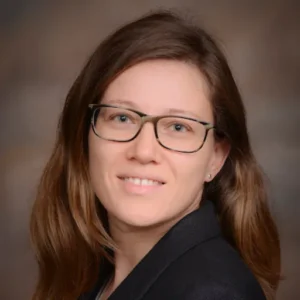 r pathways, and the need for an organic, evolving mentorship model. This workshop explores how adopting an organic approach and a mentoring mindset can create more inclusive, equitable, and sustainable research cultures.
r pathways, and the need for an organic, evolving mentorship model. This workshop explores how adopting an organic approach and a mentoring mindset can create more inclusive, equitable, and sustainable research cultures.
Drawing from my PhD research on mentorship in leadership development, this session will examine how mentorship can be an organic process rather than a rigid, hierarchical structure. Findings suggest that successful mentorship is rooted in psychosocial support, career function guidance, and the power of organizational socialization, highlighting the importance of mentors who act as advocates rather than gatekeepers.
Dr. Manuela Picariello is an accomplished scholar whose research focuses on mentoring initiatives for women and global majorities, corporate social responsibility, and sustainability within both domestic and international organizations. Born in Avellino, Italy, she embarked on her academic journey with a bachelor’s degree in management engineering from the University of Napoli, Federico II, all while nurturing a promising basketball career in the Italian minor leagues.
Her doctoral studies in San Marino were complemented by a transformative visiting scholar experience at the University of Tennessee, where she discovered a deep fascination with American sport culture. Committed to an academic career, she relocated to Knoxville in 2014 to pursue a second Ph.D. in Sport Studies at the University of Tennessee. Upon earning her degree in 2017, she joined Texas Woman’s University as an assistant professor.
In October 2021, she furthered her international career by joining Bournemouth University Business School in the UK as a Lecturer. In 2023, she was promoted to Senior Lecturer and named co-leader of both the Sustainability Academic Action Group (SAAG) and the Sustainability Academic Network (SAN) at BUBS. Throughout her career, Dr. Manuela Picariello has consistently championed inclusion, gender equality, and the reduction of inequalities, values that she brings to her role as a mentor and academic leader.
Dr. Alice Matimba
Flipping the Script:
Reverse Mentoring for Inclusive Research Cultures
Mentorship is often seen as a one-way street, with knowledge flowing from senior to junior researchers. But what if we flipped the script? Reverse mentoring is a powerful tool for fostering inclusive research cultures, breaking down hierarchies, and ensuring that diverse perspectives support research careers.
This 1.5-hour interactive workshop will explore the different types of relationships that benefit from reverse mentoring—from traditional senior-junior models to innovative approaches, including peer-level mentoring, where colleagues at the same career stage learn from each other’s expertise and lived experiences.
The workshop will be structured as follows:
- Introduction to reverse mentoring (20 minutes) – Understanding key concepts and impact
- Exploring different reverse mentoring models and contexts (20 minutes) – Identifying effective approaches
- Reverse mentoring in action (30 minutes) – Engaging in scenarios and role play activities
- Making it a real exchange (20 minutes) – Practical takeaways for implementation
Designed to be engaging and thought-provoking, this workshop will encourage participants to challenge assumptions, share experiences, and critically evaluate how reverse mentoring can be leveraged to create more inclusive and equitable research environments.
Dr. Alice Matimba is the Head of Training and Global Capacity at Wellcome Connecting Science, where she leads strategic programmes to advance genomics expertise and strengthen global capacity. She spearheads innovations in education and professional training, developing and implementing tools that drive best practices in training, leadership development, and genomics capacity. Committed to advancing equity in science, she actively works to create inclusive training opportunities that support scientists from diverse backgrounds and regions. She holds a PhD in Human Genetics from the University of Cape Town, South Africa, completed postdoctoral research at the Mayo Clinic, USA, and served as a lecturer and research scientist at the University of Zimbabwe. Dr. Matimba has a distinguished career in life sciences and clinical research, having mentored postgraduate students, led high-impact research initiatives, and authored over 40 peer-reviewed publications. Her research focused on the genomics of African populations, functional pharmacogenomics, public health interventions for non-communicable diseases, and ethical considerations in genomics. Beyond her scientific contributions, she is the Executive Producer of Your Digital Mentor Podcast, a series that explores mentoring and career development through real-world experiences and expert insights.
Dr. Nina Steinweg
The power of mentoring:
A Multi-Perspective Approach on quality assessment in Academia 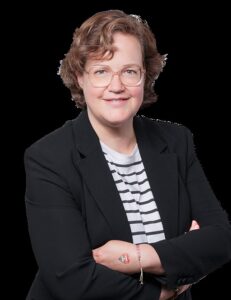
Mentoring programs play a crucial role in shaping academic and professional trajectories, yet their impact and effectiveness are often difficult to assess. The objectives of mentoring programs in academia are shaped by a complex interplay of equity-driven approaches as well as the logics of the entrepreneurial university. Nina Steinweg will adress on these challenges by sharing recent findings from the project STARQ.
The participants will then explore methods for assessing the quality of mentoring programs, discuss best practices, and critically reflect on their long-term influence on individual careers and institutional structures. By combining research insights with practical experience, this session aims to foster a deeper understanding of mentoring’s transformative potential while ensuring its effectiveness through quality assessment.
Nina Steinweg studied Law in Bonn, Heidelberg and Montpellier and graduated in Germany and France. She holds a doctoral degree from the University of Heidelberg. Nina Steinweg coordinated the Cornelia Harte Mentoring in her role as an assistant to the Gender Equality Officer at the University of Cologne from 2004-2008. Since 2008 Nina is a senior researcher at the Center of Excellence Women and Science at GESIS, leading research projects, consulting Higher Education Institutions and developing scientific services. Her focus lies on the legal aspects and the quality assurance of gender equality, diversity and anti-discrimination policies and measures in Academia. She is a member of the Scientific Advisory Board of the Women’s and Gender Research Network NRW since 2014. From 2019-2023 she lead the BMBF funded project StaRQ (Standards, Guidelines and Quality Assurance for Measures for Gender Equality in Academia) with a special focus on mentoring programmes. She conducted evaluations of gender equality measures at the Faculty of Engineering at the Friedrich-Alexander-University Erlangen-Nuremberg (2020- 2022) and at the Georg-August-Universität Göttingen (2016-2017).
Prof. Dr. Liudvika Leišytė
Transformative change towards gender equity at universities
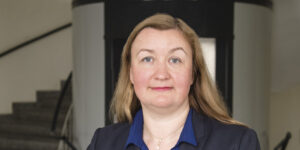
Transformative change at universities has been described as those changes that are broad and deep, where depth is evidenced by changes in values, beliefs, policies, and structures (Leišytė, Dee, van der Meulen, 2024). Universities are known to be specific loosely-coupled professional organisations that have unclear technologies and are resistant to change. Gender equity policies and practices have been part and parcel of university organizational landscapes in Europe for decades, but if one looks at the gender equity at universities, there is still strong evidence of the leaky pipeline as well as research and organizational cultures that resist gender equity (Leišytė, Peksen, Tönnes, 2022). Studies of organizational learning in universities that unpack the complex multi-level mechanisms of university transformation are helpful to understand the dynamics of successful structural and cultural change to achieve gender equity (Watts & Dowd, 2024, Dee & Leišytė, 2016). Based on research as well as practice of Prof. Leišytė in leading change processes towards gender equity in universities in the Netherlands, Germany and Lithuania, the aim of this workshop is to raise awareness of the complexity of multi-level deep change in universities to transform organizational culture. Drawing on organizational learning models, the participants will discuss factors fostering and hindering the processes of gender equity oriented change in universities and will design their pathways towards organizational transformation in their respective universities.
Liudvika Leišytė is Professor of Higher Education and Deputy Director at the Center for Higher Education (zhb) at TU Dortmund University. Prof. Leišytė is a member of editorial boards of Higher Education Policy, Triple Helix, The Learning Organization, Social Inclusion, and Zeitschrift für Hochschulentwicklung. She is an Advisory Board member of the Lithuanian Higher Education Quality Assurance Agency delegated by the Lithuanian Parliament Education and Science Committee. She is an appointed member of the project selection committee of the Stiftung Innovation in der Hochschullehre since 2021. In 2019 she served on the evaluation panel of the Norwegian Agency for International Cooperation and Quality Enhancement in Higher Education (Diku) ‚Centers of Excellence in Education‘ program. In 2023 Prof. Leišytė was elected as a member of the Academia Europaea (Academy of Europe).
Eument-net Expert Exchange „Empowering early career researchers: Starting and managing a mentoring program“
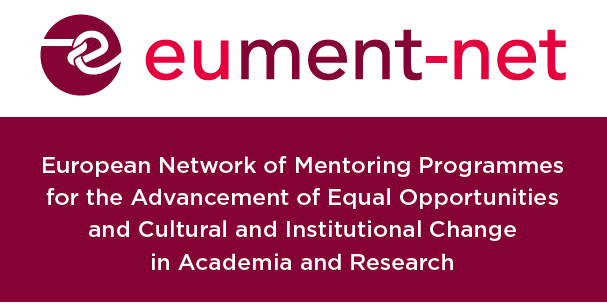

On March 12 from 10 AM to 12 PM (CET), the European Mentoring Network (eument-net) invites you to an engaging expert exchange on:
„Empowering early career researchers: Starting and managing a mentoring program“
Learn about effective approaches to mentoring and explore strategies for creating impactful mentoring programs that support the next generation of researchers.
Speakers:
Dr. Nina Fischer – „Advancing Women in Science: Why It Matters“, trainer
Dr. Ines Crisostomo – coordinator of ADVANCE Mentoring Programme of the University of Luxembourg and eument-net member
Ekaterina Masetkina M.A. – coordinator of SelmaMeyerMentoring Programme of the University of Dusseldorf and eument-net chair.
We look forward to an engaging discussion and the exchange of experiences. Join us:
Meeting-Link: https://hhu.webex.com/hhu/j.php?MTID=m7ab6087f504df85889d7b119b6c04a74
Inclusive Research Cultures Through Mentorship: a Practitioner-Researcher Dialogue
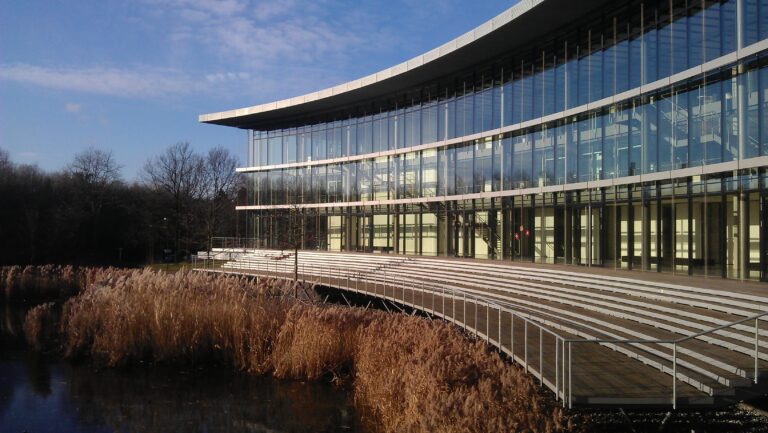

Dusseldorf, May 26-27, 2025
Committee Lead: Ekaterina Masetkina MA, Michaela Gindl MA, Dr Dagmar Höppel, Dr Evelyne Rusdea (EUMENT-NET) & Dr Ola Thomson (COST Action VOICES) will host this year’s event at the Heinrich Heine University (HHU) Dusseldorf, Germany, home to the pioneering and highly successful SelmaMeyerMentoring programme. HHU is renowned for its cutting-edge research across various disciplines. The university also hosts the Life Science Center, a state-of-the-art facility supporting innovative startups and companies in life sciences and related technologies.
Inclusive Research Cultures Through Mentorship: a Practitioner-Researcher Dialogue. Exploring the role of mentorship in shaping inclusive and transformative research culture
Universities in many European countries offer mentoring programs for women* to support their academic careers and reduce their underrepresentation in academic leadership positions. To further the professional development of experts in this field, the eument-net network and the COST Action VOICES are jointly organizing an International Expert Exchange, featuring various workshops and best-practice sessions.
Workshop 1
Transformative change towards gender equity at universities / Prof. Dr Liudvika Leišytė
Workshop 2
The power of mentoring: A Multi-Perspective Approach on quality assessment in Academia / Dr. Nina Steinweg
Workshop 3
Flipping the Script: Reverse Mentoring for Inclusive Research Cultures / Dr. Alice Matimba
Workshop 4
Organic Mentorship to Promote Inclusive Cultures / Dr. Manuela Picariello
This event brings together mentorship managers and coordinators, researchers, personal development officers, and stakeholders to share their expertise, experiences, challenges, wins big and small, and evidence-based approaches to inclusive mentoring. By bridging practical experience and academic knowledge, we aim to elevate mentorship as a tool for inclusive research cultures in which diversity is a critical building block for the common good.
Join us for a collaborative dialogue to exchange good practice, cross pollinate new ideas, and build connections across disciplines, as well as learn from non-academic settings. Together, we will explore how mentoring can become a powerful tool for cultivating equitable and innovative research environments and facilitate institutional change for inclusive gender equality.
It is possible to apply for an Erasmus+ Staff Mobility Grant to join the event in Dusseldorf. Please contact Ekaterina Masetkina for an invitation for your Erasmus Office.
Final program of the International Expert Exchange
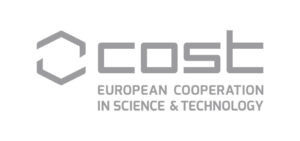

This co-organised event is based upon work from COST Action VOICES, CA20137, supported by COST (European Cooperation in Science and Technology).
COST (European Cooperation in Science and Technology) is a funding agency for research and innovation networks. Our Actions help connect research initiatives across Europe and enable scientists to grow their ideas by sharing them with their peers. This boosts their research, career and innovation.
Eument-net Expert Exchange:
Mentoring helps navigating fast-paced science
On December, 3, 2024 from 10:00 to 11:15 am (CET) eument-net invites
all interested parties to the expert exchange
Many researchers in untenured academic positions experience the tension between the drive for rapid, high-volume publishing and the need for thoughtful, in-depth research. In this talk we will discuss ways to support an academic culture that challenges the prevailing “publish-or-perish” paradigm and to foster a more welcoming and productive environment for researchers.
Beyond summarizing key developments of recent discussions, we will spotlight two unique perspectives. Insights will be shared into Anna Lena’s academic journey. Through participation in Kiel University’s mentoring programme via:mento specifically designed for women postdoctoral researchers, and through broader networking initiatives, she has found support and direction, enabling her to realign her work with her scientific values. This will be complemented by reflections on Ruth’s experiences as the coordinator of the mentoring programme, illustrating how mentoring initiatives can not only foster participants’ career development but also renew postdoctoral researchers’ commitment to scientific inquiry.
Keynotes and authors: Anna Lena Bercht and Ruth Kamm
Anna Lena Bercht is a human geographer with a background in psychology. She works in the Department of Geography at Kiel University and is an associate member of the Disaster Res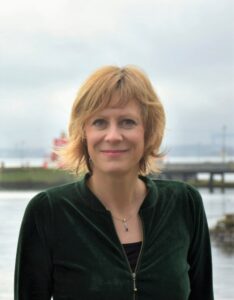 earch Unit at Freie University of Berlin. From 2015 to 2018, she was a visiting researcher at the Stockholm Resilience Centre (SRC) at Stockholm University. Her research lies at the intersection of geography and psychology focusing on human-environment relationships, climate justice and psychological barriers to behaviour change. Using qualitative research methods, she has conducted fieldwork in China, Norway and Germany. Her most recent funded research projects examine barriers to climate adaptation and explore effective climate communication strategies. Anna Lena is also a former mentee of the via:mento mentoring programme at Kiel University.
earch Unit at Freie University of Berlin. From 2015 to 2018, she was a visiting researcher at the Stockholm Resilience Centre (SRC) at Stockholm University. Her research lies at the intersection of geography and psychology focusing on human-environment relationships, climate justice and psychological barriers to behaviour change. Using qualitative research methods, she has conducted fieldwork in China, Norway and Germany. Her most recent funded research projects examine barriers to climate adaptation and explore effective climate communication strategies. Anna Lena is also a former mentee of the via:mento mentoring programme at Kiel University.
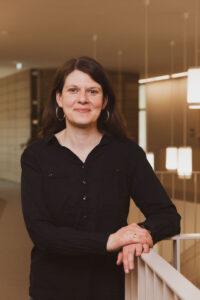
Ruth Kamm has been with Kiel University’s Central Office for Gender Equality, Equal Opportunity & Family since 2010, where she coordinates the mentoring programme via:mento for women postdocs pursuing their academic career after their doctorate. Before taking on the additional task of consulting the university’s collaborative research project consortia on their gender equality activities, she has been working for different collaborative project networks in the field of marine sciences in Kiel. Here, she has also dedicated herself to supporting women in non-tenured positions in their career development and advocating for more equality within the academic system. Ruth has a background in political sciences with a focus on higher education research.
The talk is based on the recent publication: Bercht, Anna Lena, Ruth Kamm (2024): How mentoring and a shift in mindset and practices can help navigate fast-paced science, in: ICES Journal of Marine Science, https://doi.org/10.1093/icesjms/fsae121
You are welcome to invite your interested colleagues to the meeting.
Daniela Burghila, RO
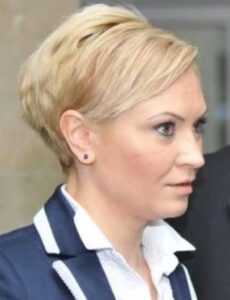 Dr. Daniela Vasilica Burghilă is the General Director in General Structure of Higher Education within Ministry of Education. She is also Associate Professor Dr. at University of Agronomic Sciences and Veterinary Medicine of Bucharest, Faculty of Land Reclamation and Environmental Engineering. She shas been previously General Director in Management of University Programs Structure and In University Titles Structure. Her research area is Environmental Engineering, Ecology, Sustainability and Land Reclamation.
Dr. Daniela Vasilica Burghilă is the General Director in General Structure of Higher Education within Ministry of Education. She is also Associate Professor Dr. at University of Agronomic Sciences and Veterinary Medicine of Bucharest, Faculty of Land Reclamation and Environmental Engineering. She shas been previously General Director in Management of University Programs Structure and In University Titles Structure. Her research area is Environmental Engineering, Ecology, Sustainability and Land Reclamation.
Luminita Popescu, RO
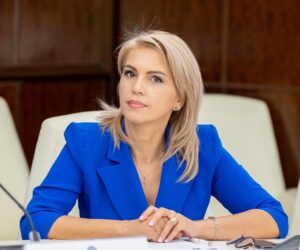 Luminita Popescu is the State Secretary at Romanian Agency for Equal Opportunities between Women and Men, a specialized central public administration institution subordinated to the Ministry of Family, Youth, and Equality of Opportunities. The Agency is responsible for the elaboration, coordination and enforcement of governmental strategies and policies in the field of equal opportunities between women and men and in the prevention and combating of domestic violence and it aims to promote equal opportunities and treatment between women and men with a view to eliminating all types of sex-based discrimination and preventing and combating domestic violence, by implementing measures, policies and programmes tailored to the victims’ needs.
Luminita Popescu is the State Secretary at Romanian Agency for Equal Opportunities between Women and Men, a specialized central public administration institution subordinated to the Ministry of Family, Youth, and Equality of Opportunities. The Agency is responsible for the elaboration, coordination and enforcement of governmental strategies and policies in the field of equal opportunities between women and men and in the prevention and combating of domestic violence and it aims to promote equal opportunities and treatment between women and men with a view to eliminating all types of sex-based discrimination and preventing and combating domestic violence, by implementing measures, policies and programmes tailored to the victims’ needs.
Ms. Popescu has represented Romania in the works of Generation Equality Forum organized by the United Nations (UN) Women where she had an intervention about Cooperation to Action: Reducing Gender Inequalities to Strengthen Social Cohesion in Latin America and Europe.
She has a Master degree on Human Rights and Bachelor studies in Law and in Humanitieshe is member of the National Body of Experts in Educational Management.